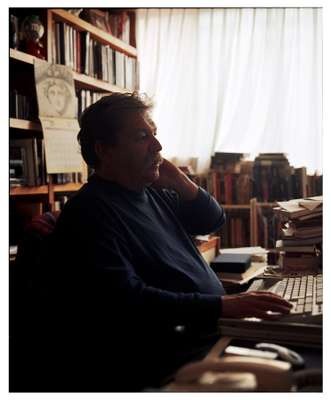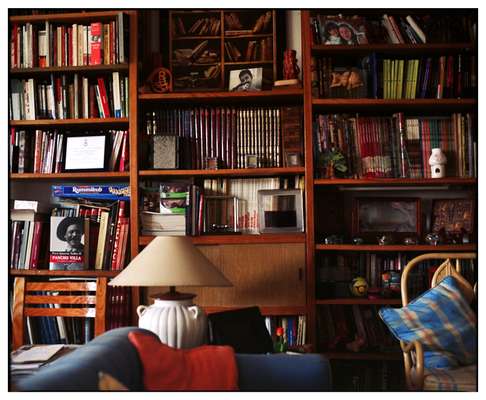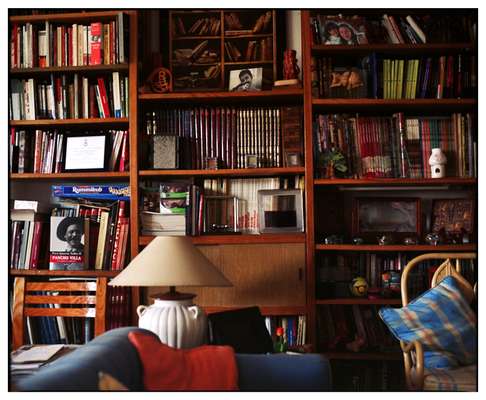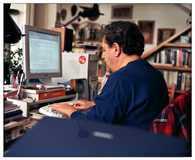Paco Ignacio Taibo II / Mexico city
Writings wrongs
Paco Ignacio Taibo II is Mexico’s foremost detective novelist, as well as a professor, journalist and political activist. Author of 50 books that have been published in 29 countries, he is best known for his novels featuring hard-bitten detective Héctor Belascoarán Shayne.
“I was five years old when I realised I wanted to be a writer. I lived in a household where the written word was everything. Soon I discovered that I could tell stories and change the ending from what really happened if I didn’t like it. There was not one specific fact or event that inspired me to write; it was a long process in which many things accumulated.
I wrote my first novel in 1969 after the 1968 student revolt because I wanted to express in a very indirect way what I had seen and experienced, but four publishing houses rejected it. Years later, in 1975, I published Días de Combate – my first detective novel. I felt that detective novels had the virtue in those days of entering the social debate through the back door. I work right here in the centre of the house, and I write every day, sometimes a lot, sometimes a little. Often I work on a variety of things until a book grabs me and then I finish it off. I usually write through the night because there is less noise and no visitors, and it is not unusual for me to still be working as dawn breaks. Sometimes I write when I am travelling, but lately I have found that difficult. Before I would write anywhere: hotels, planes, trains – European trains are great places to write.
I don’t find it hard to switch between genres or between fiction and non-fiction. On the contrary, it’s like a rest, which allows you to continue writing with the same enjoyment. When you leave the rigour of history and turn to a novel, or the other way round, leave behind fantasy and enter into the structure of a biography, it is like taking a break.
My detective Belascoarán is a bit absent-minded. Things seem to happen around him and he takes a while to absorb and understand them. Fundamentally he is driven by his curiosity. I gave him mixed Basque and Irish roots because being a foreigner makes him rootless and gives him distance with regard to everything.



Mexico City is the second major character in those books. I have a love-hate relationship with the city. I am permanently in love with this city and permanently irritated by this country. It’s a city that is simultaneously modern and ancient, Third world and First. It is not just one city, but many coexisting cities layered on top of each other. My favourite part is the Zócalo [the vast central square] and the historic centre – the eye of the storm.
After the Spanish Civil War, my father [Paco Ignacio Taibo I, also a writer] grew up as a journalist under Franco and by 1958 he couldn’t take it any more and organised the en masse immigration of the whole family to Mexico. It felt like an interminable journey by boat for a boy – 28 days in which I travelled the world.
Then we arrived in Veracruz and it was spectacular. People spoke the same language as us, but it was like another planet. I discovered mangoes for the first time. My father was very clear in his mind that Mexico was our final destination and that we would never return to Spain. I am a Mexican writer who happened to be born in Asturias. I feel at home in Asturias, but in Spain I don’t feel Spanish.
At the moment I am working on a narrative history of what really happened at the Battle of the Alamo and an adventure novel. Basically, I write the books that I want to read myself.”
I have just published a biography of Tony Guiteras. He is a great character from the 1930s, a Cuban born in Philadelphia who collaborated in the overthrow of [then President Gerardo] Machado’s government in 1933 in Cuba. After [writing the biographies of] Che Guevara and Pancho Villa I thought, ‘What other great personality who was part of the Latin American revolution is worth dedicating one or two years of my life to?’ Everyone was asking me who this Tony Guiteras was, and I said, ‘That’s exactly why I want to write the book’.
Through the years I have spent time writing and thinking about the virtues of the noir novel. It is a genre that, on the one hand, has an immense narrative hook and allows you to unsettle the reader. While on the other hand, it also permits you to make powerful sociological reflections on the state of the society in which such crimes can take place.
The movement of 1968 [factional student fighting that resulted in police-led brutality and dozens of deaths in Mexico City] formed me as a citizen and as a Mexican.
I don’t give myself a goal of the number of words to write each day. If I did have a target I would probably never meet it! I write for pleasure and at this stage I don’t have any financial pressures. When the page remains blank that’s because it’s the way it needs to be at that moment and so I change themes or I stop writing for a bit.
The emigrant
1949: Born in the northern industrial city of Gijón, Spain.
1958: His family flees Franco’s Spain and emigrates to Mexico.
1975: He publishes his first novel – Días de Combate (Days of Combat). 1976-2007: Writes another 48 books, including 10 detective novels featuring Héctor Belascoarán Shayne.
1980: Becomes a naturalised Mexican citizen.
1987: Launches Semana Negra (Black Week), a literary festival for detective writing in Gijón, which still takes place every July.
2008: Publishes his latest book, a biography of Cuban revolutionary Tony Guiteras.


